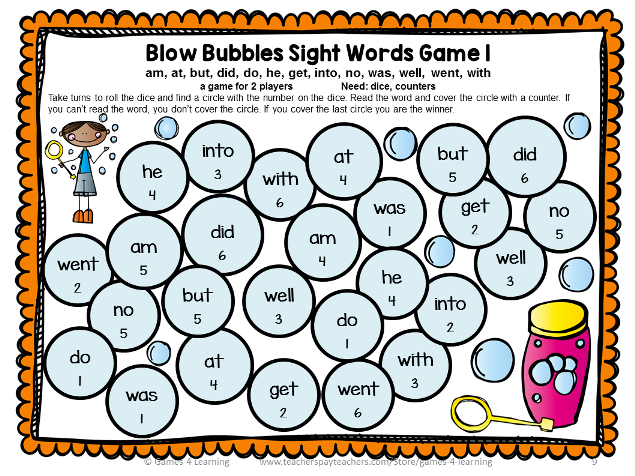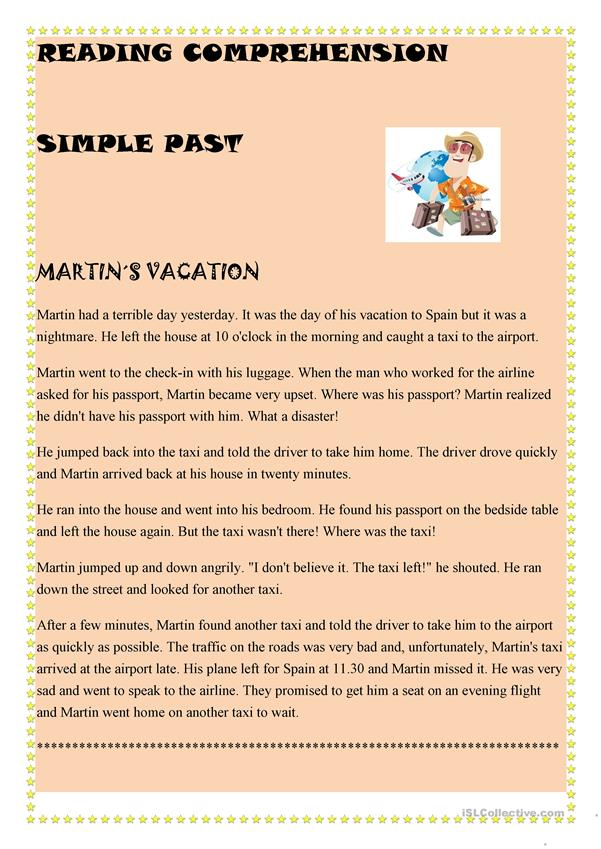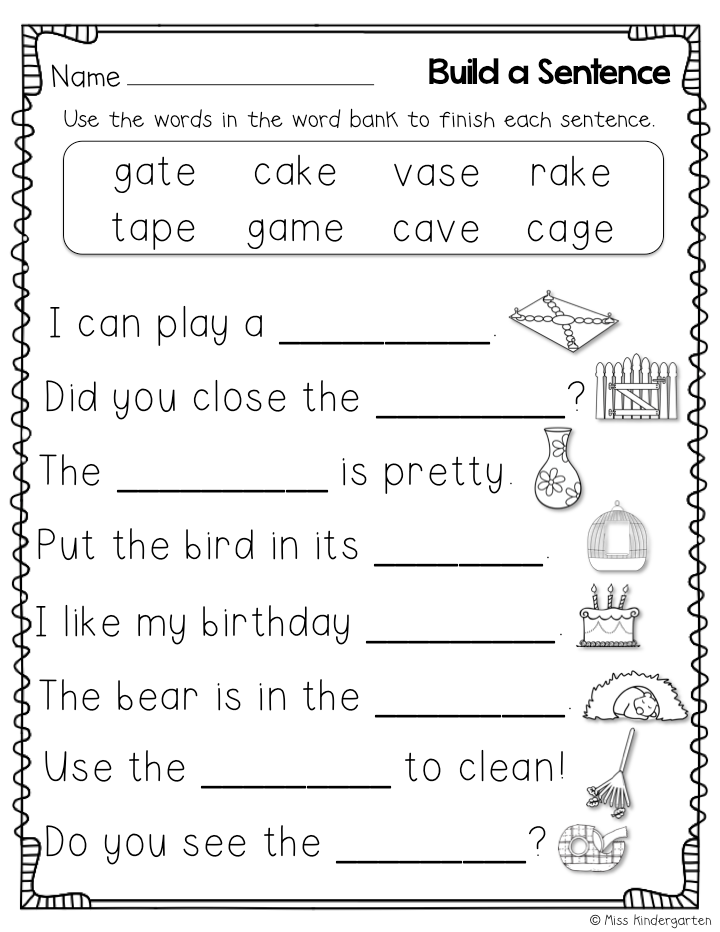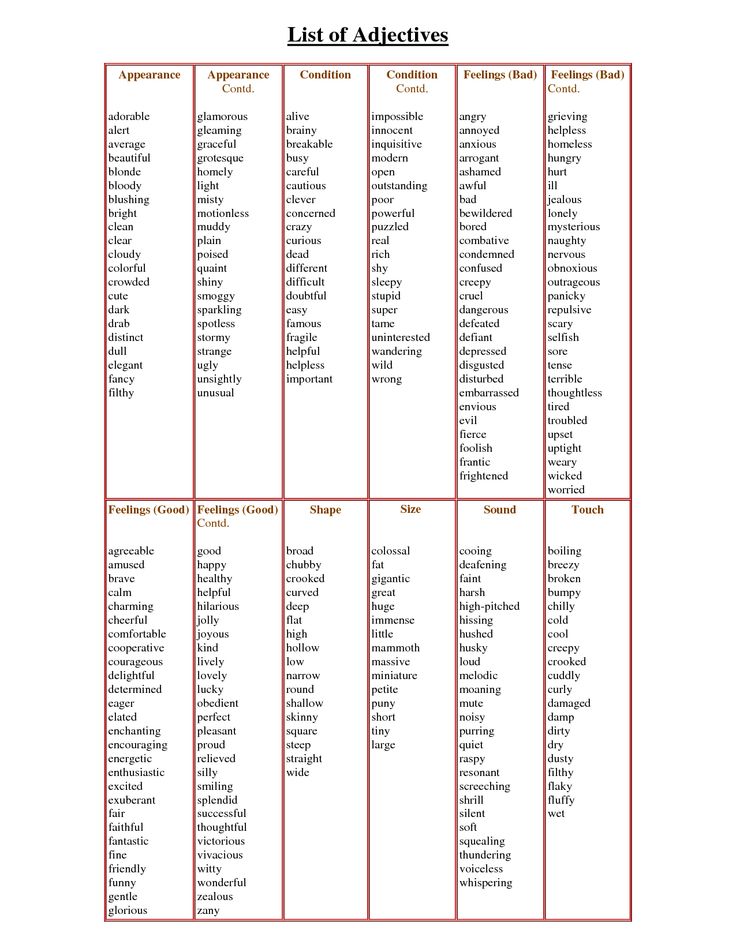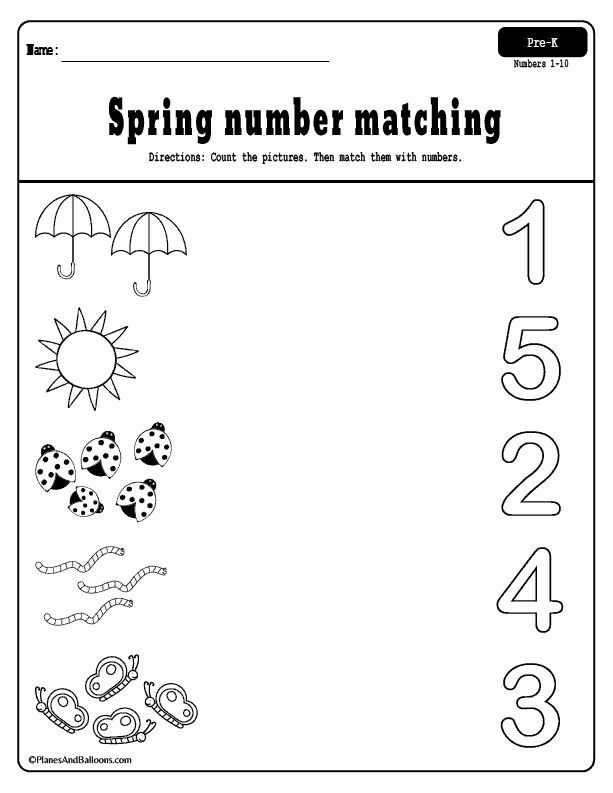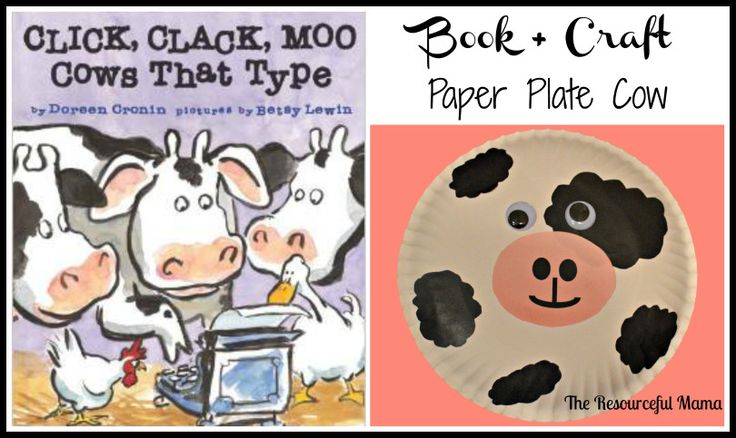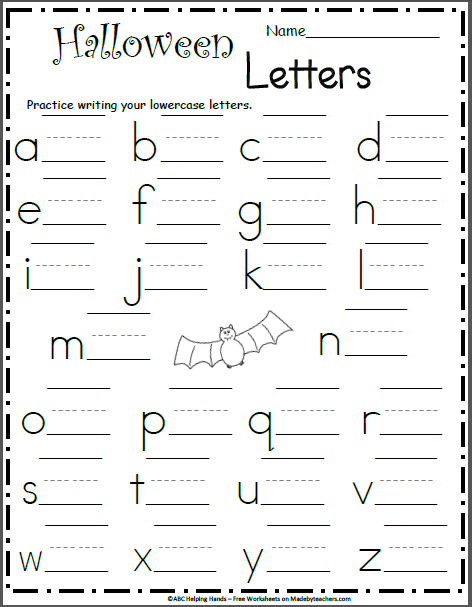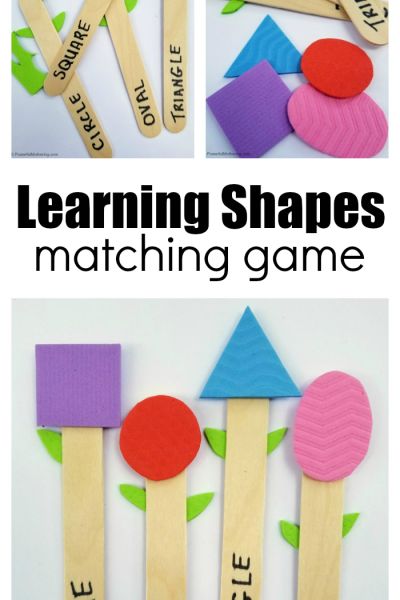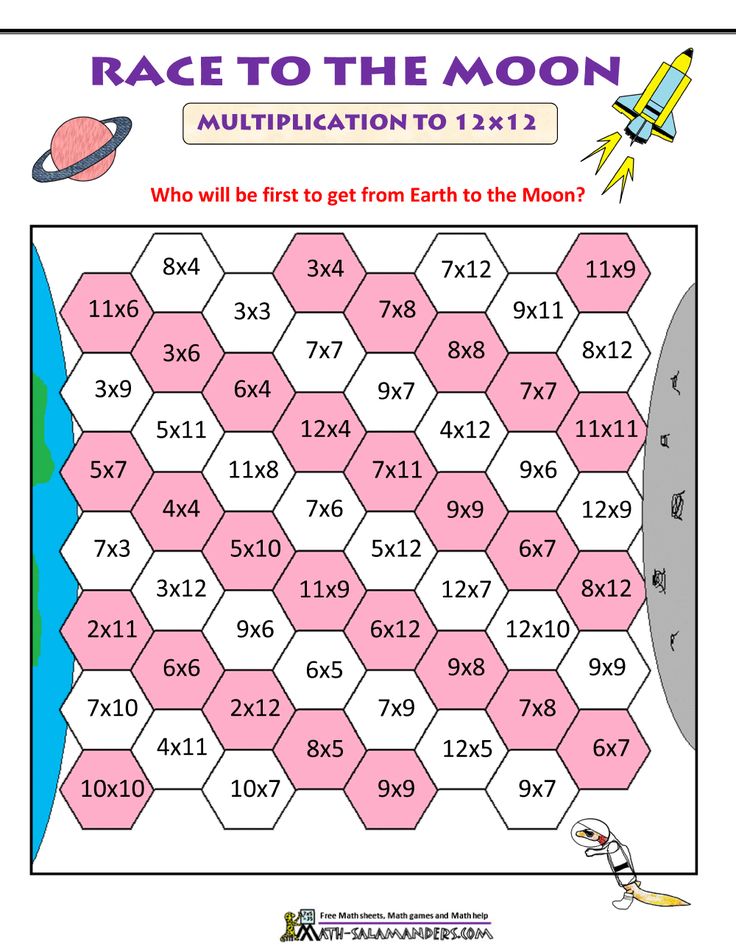Best sight word games
13 Highly Effective And Fun Sight Word Games To Help Your Kids Learn
What Are Sight Words?
What’s the most common word in the English language? It’s the. Imagine pausing every time you ran across this word in a book, on a poster, or in a magazine. Even the simplest texts would become grueling to read.
Common words in the English language (like the) are often grouped together in the early stages of reading — these are what we mean when we speak about sight words. Sight words aren’t easy to sound out or decode, especially for young readers who are just learning the rules to sound out words, so we memorize them (or, in other words, recognize them by sight).
These words occur so frequently that readers, including very young readers, need to know them instantly. And once your child learns basic sight words, they won’t need to spend a lot of time trying to decipher these high-frequency words.
Sight words are dually helpful in this way: they help your child instantly recognize familiar words and help them bypass trying to sound them out because, phonetically, they often don’t make much sense!
Why, for instance, doesn’t the word was rhyme with has? Why doesn’t have rhyme with gave? The first of each is phonetically irregular, despite the fact that they’re some of the most common words in the English language.
As adults who learned to read many years ago, we don’t think twice about why we pronounce sight words the way we do. We also don’t consider why was and has or have and gave don’t rhyme.
Our reading of these words happens automatically, and that’s what helps us read fluently. But early readers who are learning the rules of the English language need a little help.
That’s where sight word games come in. We’ve compiled a list of fun activities that you can do with your young reader to help them learn sight words. And these activities are great for both you and your child.
For you, a majority of the activities require minimal supplies and prep time, which is great for a busy parent. For your child, the games are lots of fun, so they can learn without even realizing it.
But before we get to these fun activities, let’s be clear on the specific sight words your child will need to be familiar with.
What Words Should You Use For Sight Word Games?
Decades ago, an educator named Edward Dolch developed a list, used widely by teachers, of the words most frequently used in children’s books.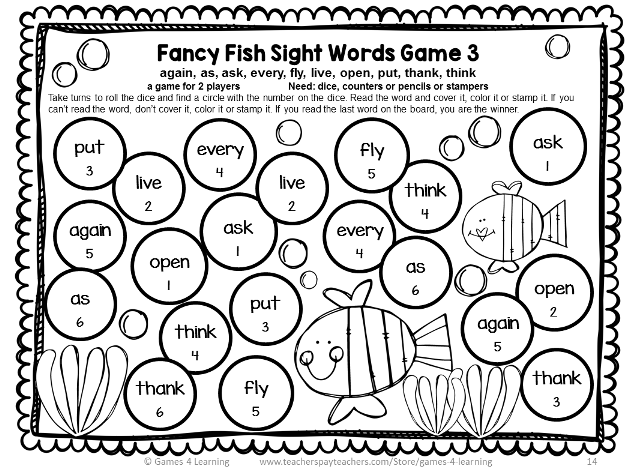 He identified 220 “service words” and 95 nouns. The words are broken down by levels: pre-primer, primer, first grade, second grade, and third grade.
He identified 220 “service words” and 95 nouns. The words are broken down by levels: pre-primer, primer, first grade, second grade, and third grade.
Some of the 315 words that comprise the two lists are very easy for kids to learn: a, I, it. Others offer more of a challenge. For instance, the pre-primer list includes you, said, and where.
Here is a list of the 45 sight words we include in our Beginning Reader and Growing Reader pathways:
And, a, the, on, is, to, I, was, you, your, yes, no, do, they, with, that, are, said, girl, boy, were, this, look, like, want, has, of, what, see, go, play, here, very, good, his, her, there, where, have, walk, talk, know, blue, green, little.
Are Sight Words Just High-Frequency Words?
The short answer: not quite. But it’s a little more complicated.
While the terms sight words and high-frequency words are often used interchangeably, there are some key differences.
High-frequency words, as the name suggests, are the most commonly found words in our written language.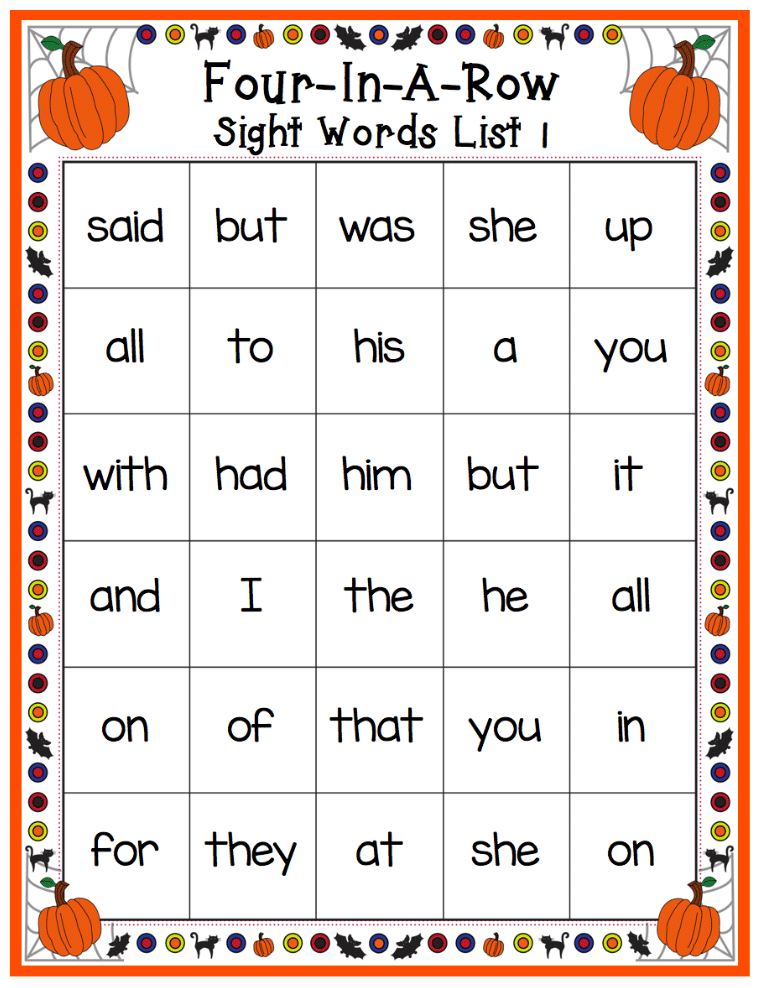 For example, like, the, it, etc., are all high-frequency words. And some of them follow standard phonetic patterns while others don’t.
For example, like, the, it, etc., are all high-frequency words. And some of them follow standard phonetic patterns while others don’t.
On the other hand, though sight words may frequently occur in text, what sets them apart is that they do not fit standard phonetic patterns or the applicable phonetic rules are more advanced. Therefore, they often need to be memorized.
In essence, many high-frequency words can become sight words once a learner reads them instantly without trying to decode them.
One of the best ways to help kids get to this stage of word recognition is to continue exposing them to sight words. This is where games come into play!
13 Fun Sight Word Games To Help Your Child Learn
Parents wear many hats — companion, guidance counselor, teacher, and so on — and all of them are crucial. But one of the most enjoyable parts of being a parent is cutting up with your child and having a little bit of fun.
The good news? Your child can learn and have fun at the same time while playing these games!
We know how invested you are in your child’s future.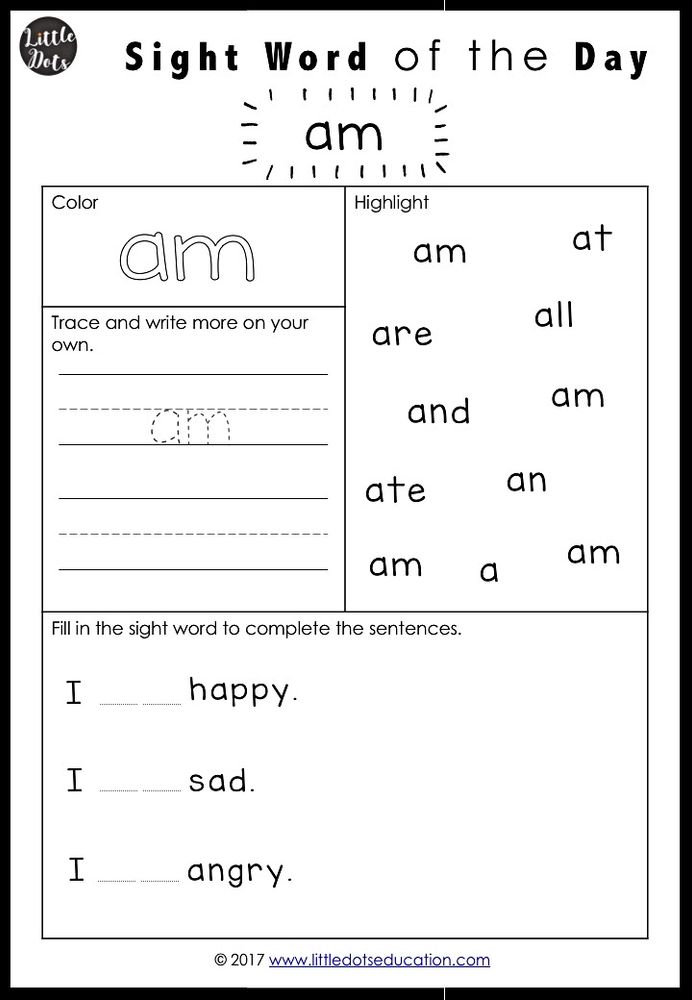 We want to help you set them up with the best tools for success in the easiest, most enjoyable way possible. So here are some sight word games that will get their brain working and their belly laughing!
We want to help you set them up with the best tools for success in the easiest, most enjoyable way possible. So here are some sight word games that will get their brain working and their belly laughing!
1) Sight Word Twister
This is a version of the popular game Twister. If you want to try this game, choose between six or twelve words to work with at a time.
That number will depend on your child’s comfort level with sight words, their attention span, and the amount of time on your hands! Feel free to start small and work your way up with additional rounds.
Write each sight word you chose on a blank index card. Then, clear a space on a wooden or linoleum floor and tape each word so that they are all just a little bit apart from each other (make sure your little one can still reach!). Now the fun begins.
Tell your child to find one of the words — have, for instance — and place an elbow on the word. Then they must put their knee on a second word and their nose on a third.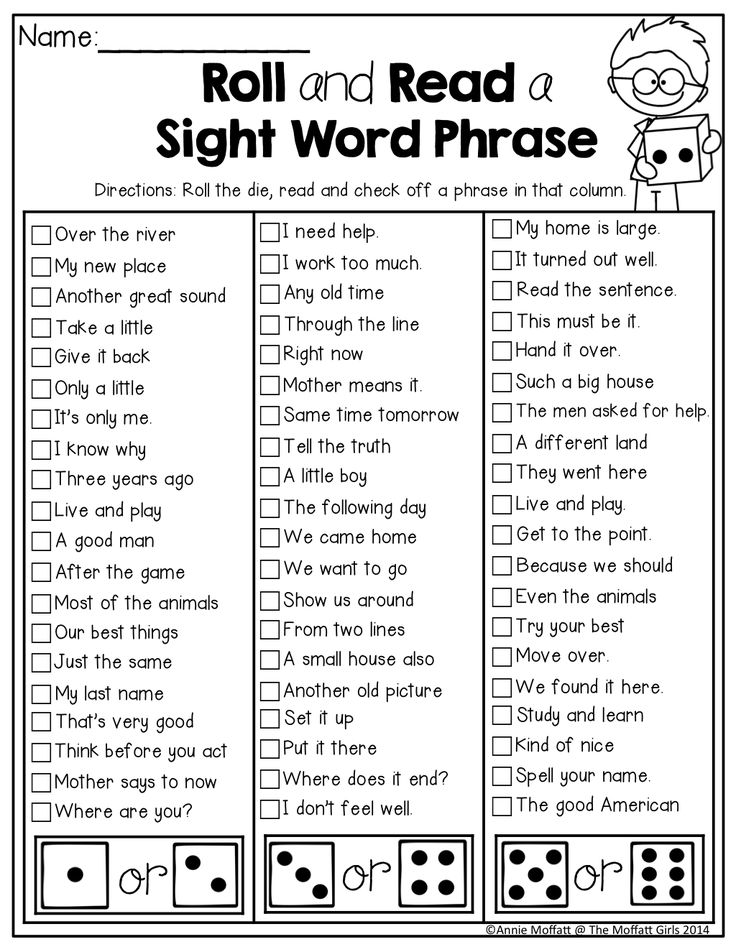 You can go on to a fourth, fifth, or sixth word, or you can stop at three.
You can go on to a fourth, fifth, or sixth word, or you can stop at three.
Your child isn’t the only one who has to twist and turn. In our experience, children want you to play along with them and be just as silly about the shapes you make with your body!
Plus, giving your child the chance to choose the word you have to touch helps them practice reading their sight words. Being the “game boss” will give them another opportunity to learn!
Your child may have a blast with this game and insist they want to keep going, but it’s best to limit your play to two or three rounds per player. That will help keep them from getting bored with the game (and give their brain a chance to rest!).
2) Pick The Word
If you want to try this game with your child, write your six sight words on index cards — one word per card. On a separate sheet of paper, list the six words twice — one list for you, one for your child.
Next, place the index cards with the words facing down. You can take the first turn. After picking a word from your list, flip four of the cards so the words are showing. If you uncover the word you’re seeking, you can cross that word off your list.
You can take the first turn. After picking a word from your list, flip four of the cards so the words are showing. If you uncover the word you’re seeking, you can cross that word off your list.
At the end of your turn, flip the cards back over, mix them up, and give your child a turn at flipping four of the cards.
If on your first turn you did not find the word you wanted, you have to hunt for the same word on your next turn. If you found the word you wanted, pick a second word from the list.
The first player to cross off four words wins. To make the game more challenging, you can turn over three cards per turn instead of four, or you can aim to find all six words instead of just four of the words.
3) Word Match Up
On a sheet of paper, write your six sight words three times. Your child’s job is to draw a line that connects each word to the two identical words on the sheet.
After drawing a line that connects the first three words, it’s time to connect the next three matching words.
This game may sound pretty easy, but here’s the hitch: your child cannot cross any line already on the page. The page gets pretty crowded with lines, so this is not an easy accomplishment. They may end up with some kooky, loopy lines — and that’s the goal!
Try it yourself. The more you stumble and struggle, the more your child will enjoy the game!
4) Word Toss
If you’d like to give this game a go, write each sight word on its own Post-it® and then stick the words on the floor. You can also stick them to a wall or a door.
Get a soft toy, like a small stuffed animal, and stand a few feet away from the words. Choose a word and say it aloud. Your child must toss the toy so that it hits the right word.
Your turn next. Your child picks a word for you to hit. The game is more fun if you miss, so don’t worry about having poor aim. You can play to see who reaches a set number of points or who has the most points after five or six rounds.
5) Sight Word Bingo
Selecting from the Dolch lists, you can make custom Bingo cards that use sight words.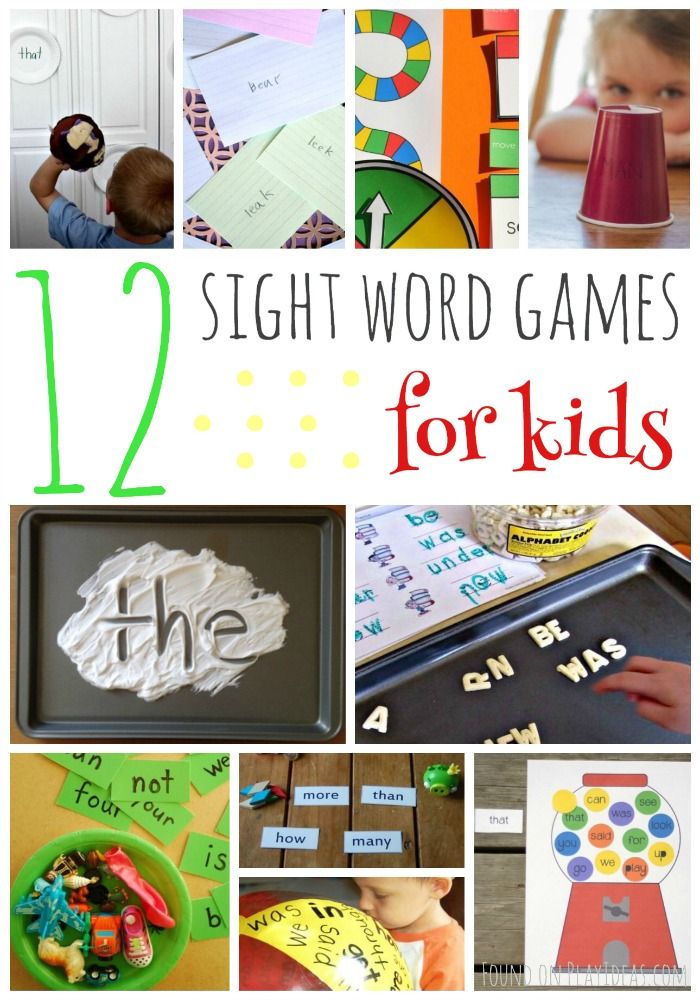 It makes the perfect, classic sight word game for your child!
It makes the perfect, classic sight word game for your child!
We’re sure you know how Bingo works, but just in case, we’ll give you a refresher. Set up one regular bingo board each for you and your child. If more people are playing, you might have teams or make sure you have one card for each player.
Tell your child to pick 24 words. The same words will go on both boards, but in different places on each board. Then write the words on index cards. Turn the cards over and mix them up.
Players will take turns picking cards — reading the words and finding each word on their card. When they find a word, they will cover it with a token or a penny. The first person to get five words in a row wins. Bingo!
6) Sight Word Go Fish
Introducing your child to this game will be easier if they have prior experience with Go Fish. If they don’t, that’s OK, too! It’s easy to learn and a blast to play.
If you’d like to give this game a go, use index cards or cut pieces of paper for playing cards.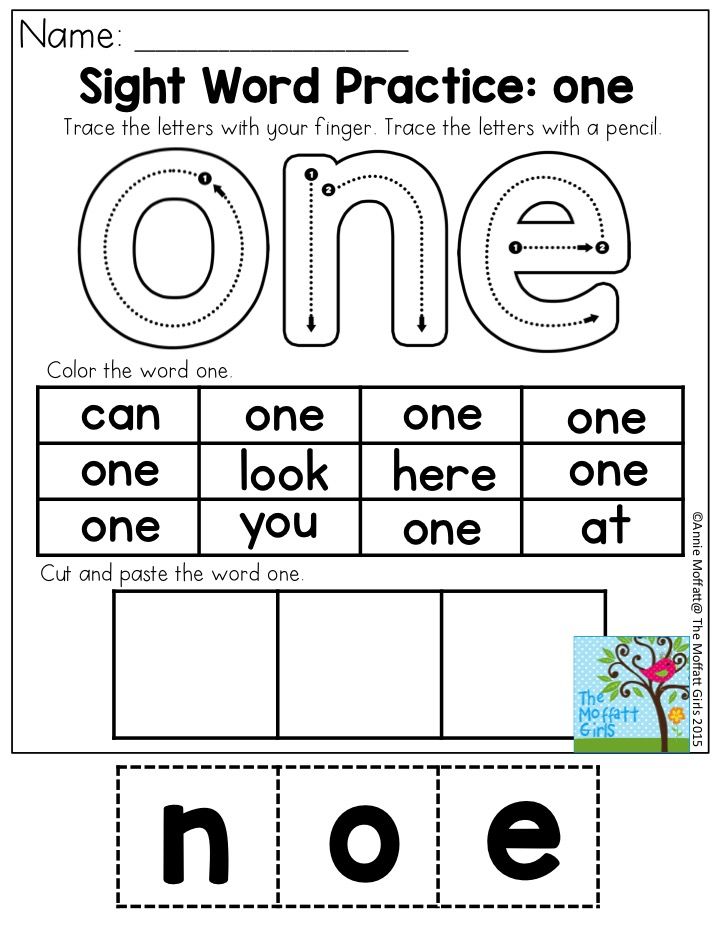 You can write matching pairs of whichever sight words you want your child to focus on. It’s important that there are at least two cards for each word — the point of Go Fish is to match them!
You can write matching pairs of whichever sight words you want your child to focus on. It’s important that there are at least two cards for each word — the point of Go Fish is to match them!
We recommend starting with 20 cards (ten sets of words) and giving each player five cards in their hand. You can decrease the number for younger children and increase the number (or difficulty) of words as your child gets more comfortable playing.
Tip: For younger kids, you might let your child lay the words on the floor and hide them from you by using a book as a shield rather than them holding the cards in their hand, as that can be challenging.
Your child will read out the word they want to match. If the word is an, for example, and you have the other an card in your hand, then you have to hand it over. If you don’t have the matching card, then you tell them to “Go fish!” from the pile of extra cards.
If your child is a little older and experienced with some sight words already, feel free to sprinkle in words they already know.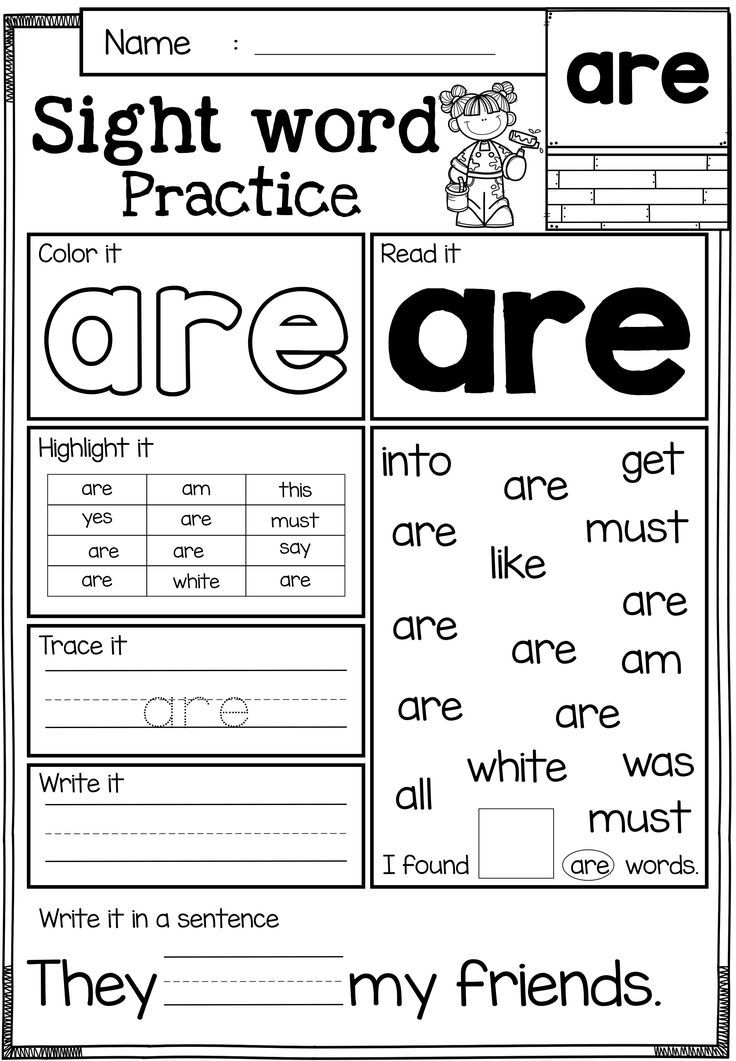
The familiarity will help their confidence as they work with their new words. We all like the feeling of knowing how to do something correctly — reinforcing their knowledge positively (like through a game!) will help keep them encouraged to learn more.
7) Sight Word Scavenger Hunt
This option is super versatile — it can be played indoors or outdoors!
We all love a good, old-fashioned scavenger hunt. Instead of hunting pastel eggs filled with candy, though, this game has your child hunting their sight words.
If you want to try this game with your child, write the sight words you want to use on a stack of index cards and number them 1-10. It may also be beneficial to write the words on a separate sheet of paper for your child to reference so they know the selection.
Then make a list of clues for those same words on a separate piece of paper. For example, one clue might be, “I __ a cookie” (have) or, “What word rhymes with buzz?” (was).
Next, simply hide the cards in places familiar to your child.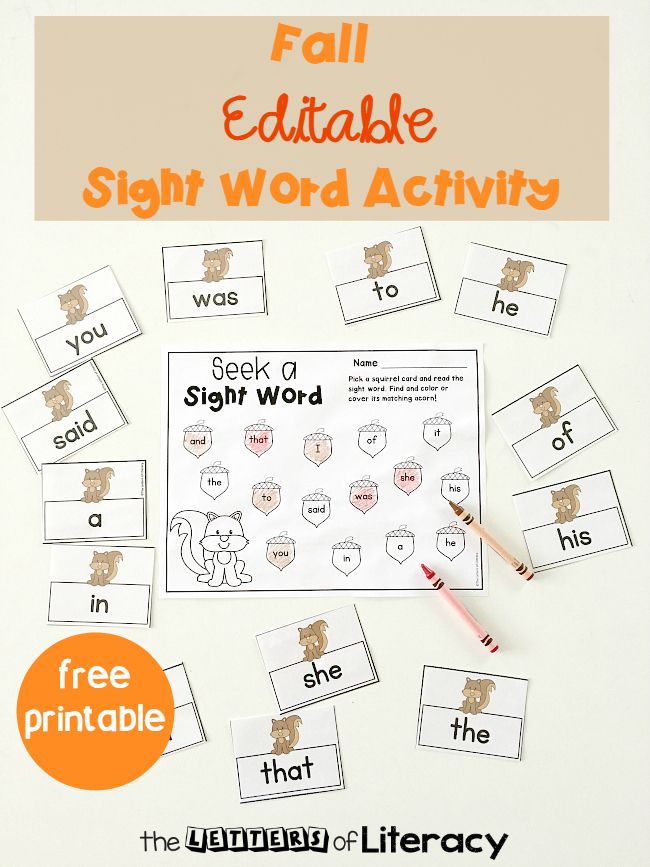 You can use the backyard, a favorite park, or your whole house if it’s an extra rainy or cold day. They’ll use the clues to figure out which words to search for.
You can use the backyard, a favorite park, or your whole house if it’s an extra rainy or cold day. They’ll use the clues to figure out which words to search for.
Tip: make sure you remember where you put the cards! You’ll need to keep in mind the different locations while you write out your sheet of clues. The numbers on the cards should coincide with the clues. Have fun with some wacky rhymes and hints that will get your child laughing!
The clue list can also be made optional. If you’re working in a small space, your child can always just try to find however many words you hid. If they know to look for 10 cards, then they can just run wild through the room (hopefully not upturning furniture!) searching for them.
8) Sight Word Tower
This is an easy, fun sight word game for your child to try that we guarantee they’ll love — because it involves things crashing and making a mess (but one that’s easy to clean up, we promise!).
While trying this game, you’ll need a stack of paper or plastic cups that you don’t mind writing on with a marker. Near the rim of each cup, write a single sight word you want your child to focus on (that way all the cups are the same).
Near the rim of each cup, write a single sight word you want your child to focus on (that way all the cups are the same).
Then your child simply picks up the cup, reads off the sight word, and tries to create a “tower” or “castle” out of all their sight word cups! Here’s the rub — you can only have three cups on the floor! All others must build on top of those three and cannot be inside each other.
The trick is to make sure the cups don’t fall over — if they do, you have to start again! They win once they stack all the cups (and read all the sight words!).
9) Volleyball
This sight word game is easy and simple as well. All you need is an inflatable beach ball that you can write on with a permanent marker.
For each “sliver” of the beach ball, you’ll simply write down a sight word. Then you and your child will toss the ball back and forth. If you want to simulate a proper volleyball game, then you can do this over a net propped up in a yard.
When you catch the volleyball with your hands, you have to read aloud the two words your thumbs touch.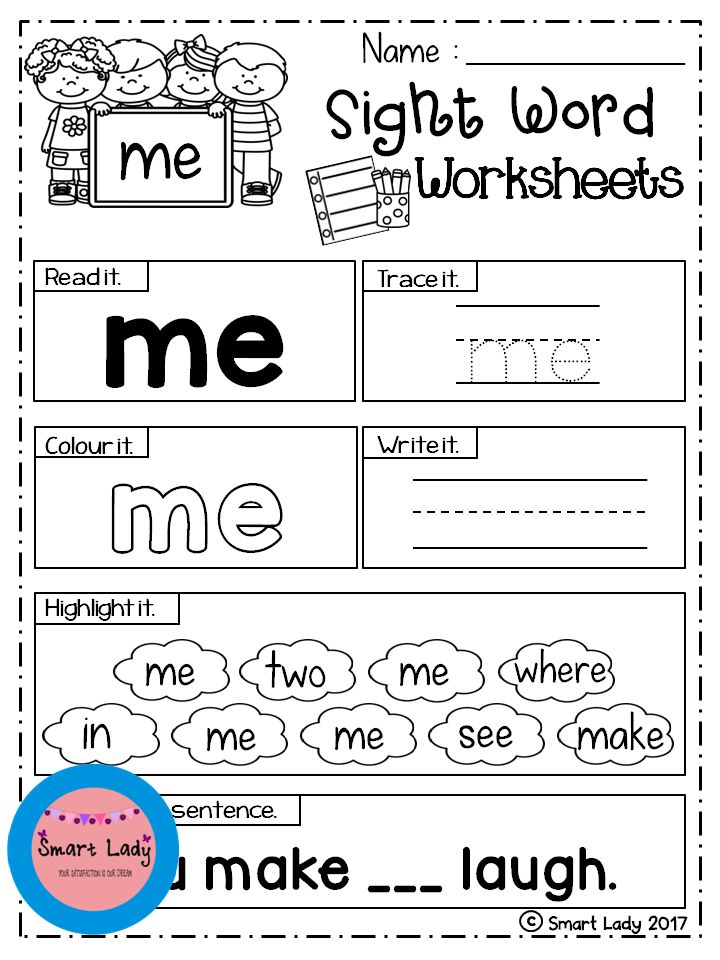 For example, your left thumb may touch the word “blue” while your right thumb touches the word “our.” Once you read the words, toss the ball back to the other player.
For example, your left thumb may touch the word “blue” while your right thumb touches the word “our.” Once you read the words, toss the ball back to the other player.
You don’t have to write in-between the lines on the ball, either. To make it wilder (and challenging!), you can write words all over the ball. That way the words your child “catches” are even more unpredictable.
10) Sight Word Path
All you need for this fun game is masking tape (or painter’s tape), index cards, and a marker.
First, write one sight word on each index card. Then, arrange your cards face up on the floor to make a “path.” This path doesn’t have to be straight. It can have as many twists and turns as you’d like (i.e., over the chairs, under the table, etc.).
When placing the cards, make sure they are close enough to each other that your child can step from one card to the next. Important tip: Don’t forget to tape them down with your masking tape to prevent slips or falls. Safety first!
Your child will need to stand at the beginning of the “path” you’ve created and read the word on the first card out loud to start the game.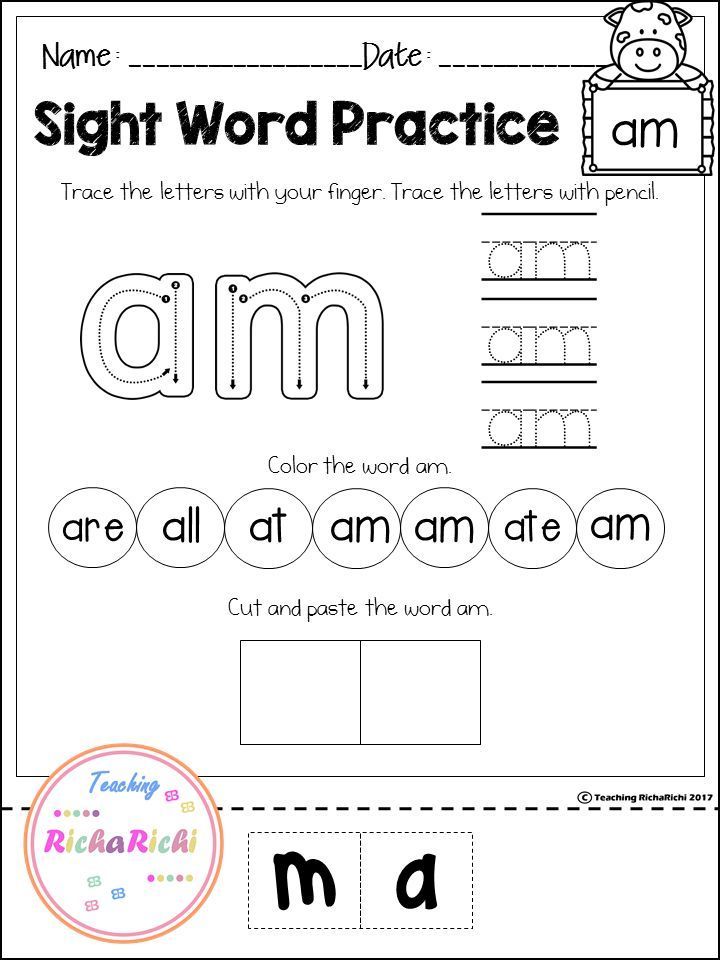 Then, when they’ve read it correctly, they step onto that card.
Then, when they’ve read it correctly, they step onto that card.
The goal is to read the next word, and the next, and so forth until they reach the end of the path. If you’re playing with multiple children, each child can start once the player before them has gotten to the end of the course.
Once your child is comfortable with this game, encourage them to read and walk more quickly. If they are just starting to learn sight words, you can first introduce them to easy terms and increase the difficulty as they go along.
This activity helps kids read sight words quickly and gain confidence through repetition. They’ll also be burning a lot of energy in the process!
11) Hangman
Hangman is a popular game that can also be great to help children learn sight words. To begin, grab some index cards, a marker, and some sheets of paper.
Write one sight word on each index card. Then, use your marker to draw a Hangman “scaffold” on a sheet of paper. (You can also use a chalkboard and chalk for this activity if those are available. )
)
Next, place the sheet of paper in front of your child, and put the index cards face down next to it. To play, have your child draw a card from the stack and read it aloud. Give them five to 10 seconds to do so.
If your child mispronounces the word on their card, show them how to add the first body piece to the hangman structure (e.g., the head). That index card will then return to the bottom of the stack for them to try again later.
(Remember to help them pronounce this word before returning it to the stack so that they’ll be better prepared next time.)
If they pronounce the word correctly (yay!), move that card to a “correct” pile. Then, continue playing until all the Hangman body pieces have been added — head, torso, arms, and legs.
Once the game is over, have your child count all the cards from their correct pile and tally this as their score. If you’re playing with more than one person, the one with the most cards is the winner! Note: Each child will need their own sheet of paper with the Hangman structure.
If you’re playing with very young children just starting to learn sight words, you can take two turns to draw each body piece (e.g., for legs, you can draw from the waist to knees, then the knees to the feet). This will give them more chances to get words right before the game ends.
If your child or children are more familiar with sight words, begin the game with the head and torso already drawn, giving them fewer chances to make mistakes.
Also, since any mispronounced words get returned to the stack of cards, your child will be exposed to them again, giving them more opportunities to get the pronunciation correct.
12) Sight Word Discovery
Most kids love discovering interesting items in their homes or backyards. Sight Word Discovery takes this natural love for exploring and mixes it with learning.
You’ll need a few items to get started — index cards, a marker, a large plastic tub, a lot of sand, and craft sticks and rocks (these are optional).
First, write a sight word on each index card.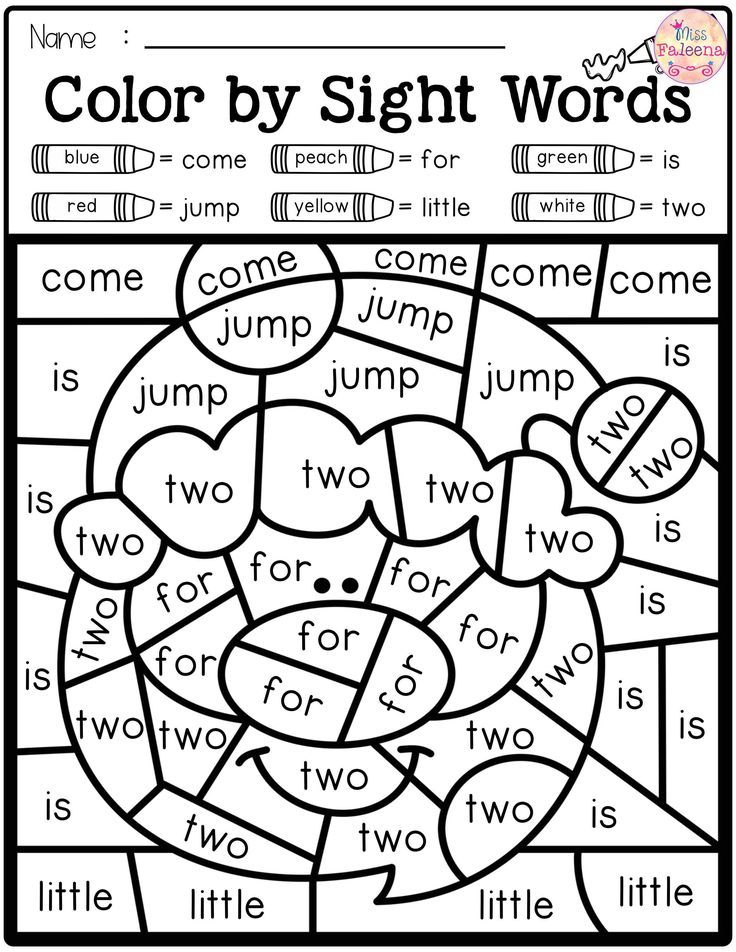 Then, fill the large plastic tub with sand. While filling it up, randomly put the index cards into the tub. You can add some sticks and rocks to the mix as well.
Then, fill the large plastic tub with sand. While filling it up, randomly put the index cards into the tub. You can add some sticks and rocks to the mix as well.
For this game, your child will need to act as a paleontologist who’s on the hunt for sight words (no fossil-finding today!). Every time your child finds a new card, have them read it aloud.
Wow! Look what I found! It’s “the!”
Sometimes parents find it difficult to encourage their children to participate in learning activities or games. But, since children often love playing with sand or dirt, you don’t have to worry about that here!
13) Sight Words On Playdough
Hands-on learning activities are a great way to help children grasp many concepts. That’s because they’re very interactive, allow for creativity, and help to make abstract concepts real.
All you need to get started with this game is playdough, magnetic letters (or letter cutouts from cardboard paper), index cards, and a marker.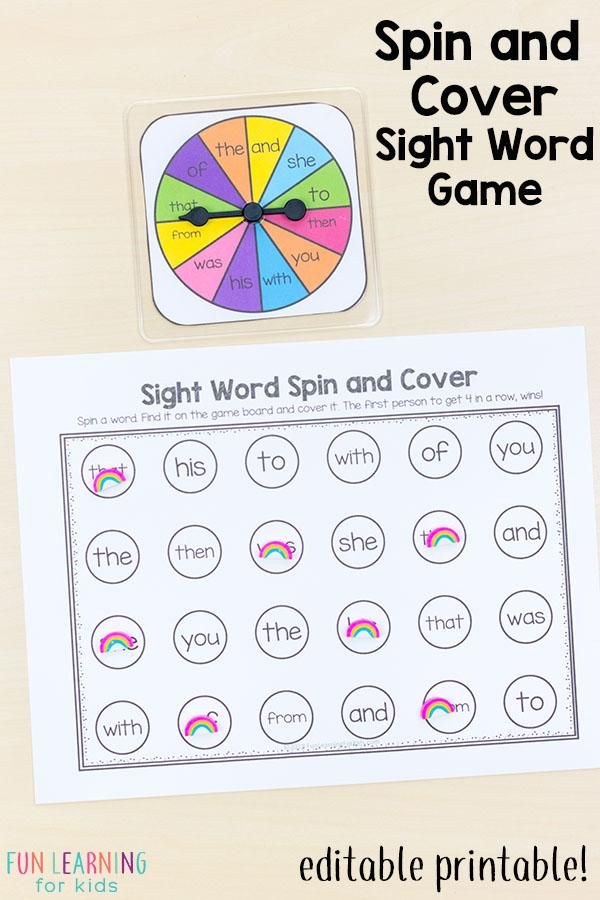
The goal is to encourage your child to construct sight words using the magnetic letters. They will then place these letters upright on the playdough.
To play, place a stack of index cards in front of them, face down. Each index card will have a sight word. When your child draws a card, they’ll need to read it aloud and then construct the word on the playdough.
For example, if your child draws the word like, they’ll need to read it, find the word’s letters, and place them upright on the playdough.
To make things a little more interesting, give your child a timer and ask, “How many words can you construct in five minutes?”
This is a great hands-on learning activity to help kids build their own sight words. And playing with multiple children can add some friendly competition.
What About Reading?
Here at HOMER, we’re big advocates of early childhood reading.
Not only do books expose your child to sight words (and high-frequency words), but they also help improve their vocabulary, strengthen their concentration, and expose children to the world around them.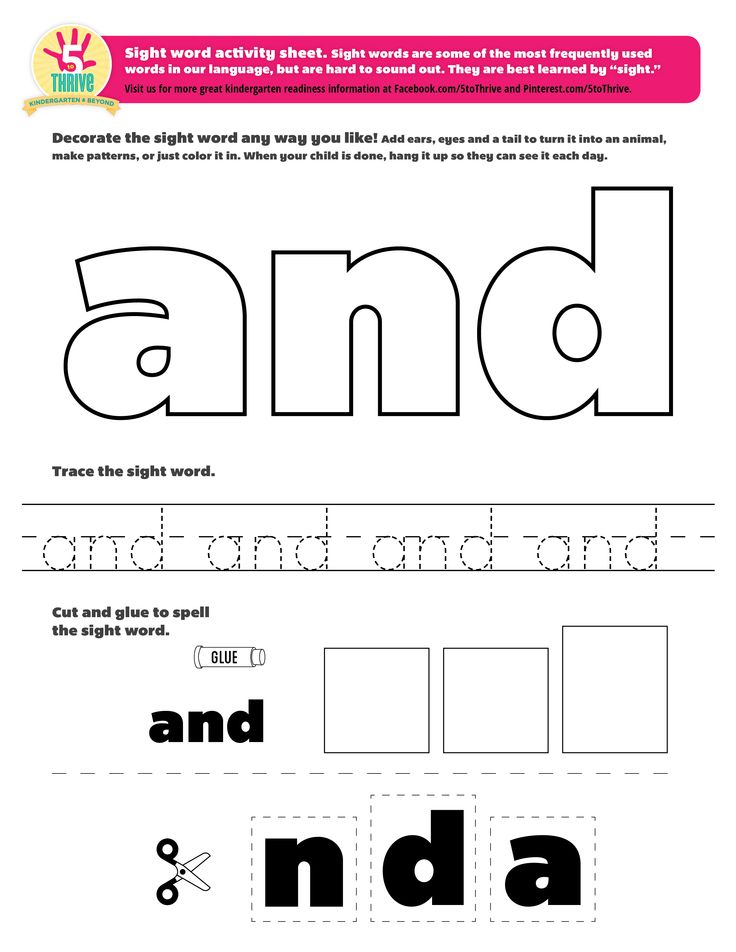
In addition to playing the above sight word games, you can also continue to read regularly to your child to familiarize them with sight words.
Here are a few activity books you can also check out:
- Learn to Read: Sight Words Storybook (For three to five-year-olds)
- Sight Words Word Search Book for Kids (For four to eight-year-olds)
- 100 Sight Words Kindergarten Workbook (For four to six-year-olds)
- Sight Words Activity Book (For five to nine-year-olds)
- Sight Words and Spelling Workbook (For six to eight-year-olds)
Sight Word Games Are Fun And Functional
Games like these are easy to play, require very little equipment, and are highly effective. The more you play these or similar games, the faster your child will learn lots of sight words, which will make them stronger, more confident readers.
We hope you found some interesting options in this list that you’ll try with your child. Remember, sight word games are all about having fun and learning at the same time! Your child will work up their stamina the more they play these sight word games.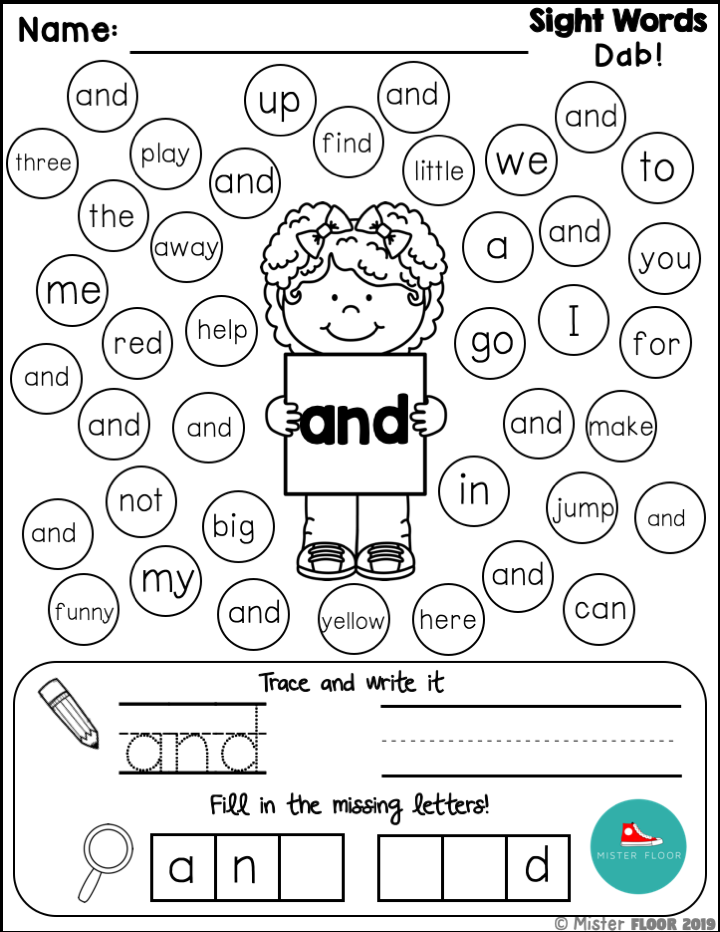
And as always, we’re here to offer a helping hand any time you need it. If you find yourself struggling to fit in practice time for your child’s sight words, you can leave them in our hands with the HOMER Learn & Grow app!
Author
26 Sight Word Games For Kids To Practice Reading Fluency
As students start their reading journey, they will come across certain high-frequency words that they should be able to identify in an instant. There are plenty of fun activities you can implement in the classroom or at home to help kids get acquainted with these common sight words and become comfortable with using them.
Sight word games should be part of a daily routine to help them become second nature as kids move on from a basic reading level. Have a look at these awesome games to get students ready to read fluently in no time!
1. Wear a Crown
Use a free printable template to give students a crown with a sight word on it.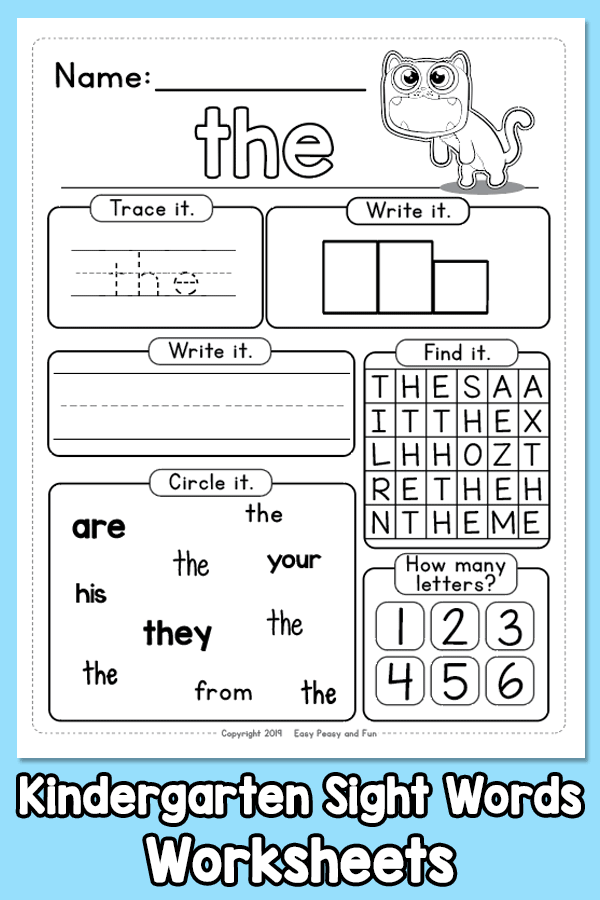 They can go around to their friends and read out each other's words and make sentences with them for extra practice.
They can go around to their friends and read out each other's words and make sentences with them for extra practice.
Read more: Mrs Jones Creation Station
2. Make sentences
Place sticky notes around the house on a variety of objects. As kids find them around the house they can create sight word sentences on the go. It's a great game to play on an ongoing basis.
Read more: Kinney Pod Learning
3. Fly Swat Game
This game is classic and incredibly effective in its simplicity. Write sight words on a blackboard and hand 2 students a fly swatter each. Call out a word and have them race to the board and see who can swat the word correctly, first.
Read more: English Azerbaijan
4. Pancake Flip
Write some basic sight words on round cardboard cutouts and let kids flip the "pancake" as you call out the words. It's great for word identification and even helps with fine motor skills as little hands try to use a spatula for flipping.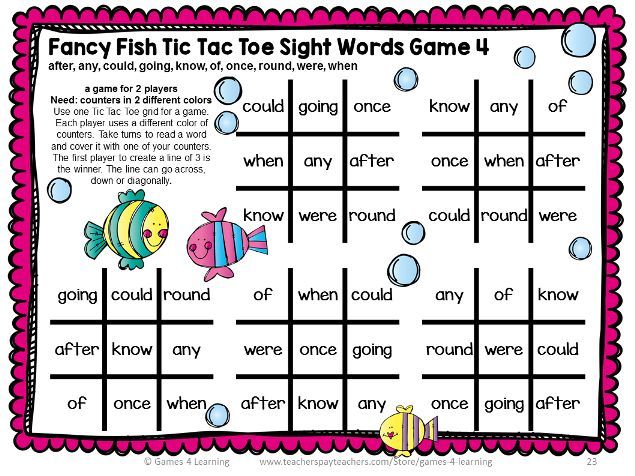
Read more: Play Dough to Plato
5. Treasure Hunt
Write a couple of words on paper and place them in a tray. Cover them in colored salt or sand and let the students hunt for the correct words. They use a paintbrush to uncover the words and find the hidden treasure.
Read more: Love for Little Learners
6. Sight Word Ball Games
Write the words on some ball pit balls and lay them out on the floor. Have kids do some gross motor activities like hip, twirl, or jump to the ball with the right word on it. They can even try to throw the ball at a target if it is safe.
Read more: Preschool for You
7. Start a Band
All kids love banging away aimlessly on some pots and pans. Use sticky notes to put some sight words on your kitchenware and let the kids bang on the correct words as you call them out.
Read more: Early Years with Mrs G
8.
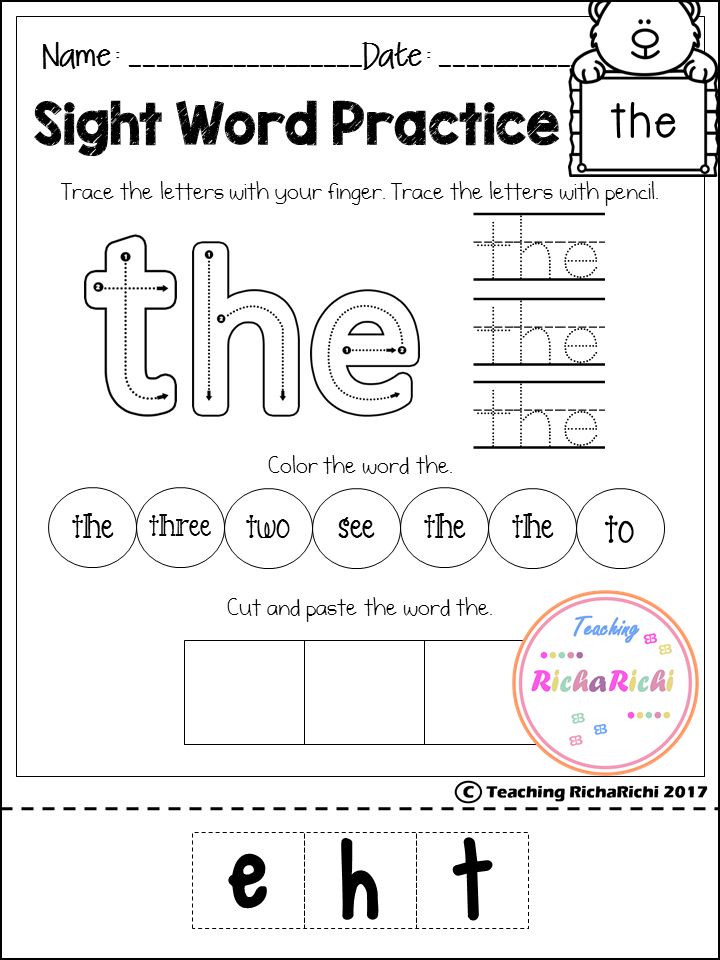 Sand Writing
Sand Writing This is one of the best sight word activities with only a few supplies. Put some salt or sand in a tray and write sensory words on cards. Kids need to trace the words in the sand or salt and work on their reading skills by reading them out loud.
Read more: Make it Multi-Sensory
9. Sight Word Monster
Get creative by building a sight word monster from a used tissue box. Kids can identify the words on the flashcards and feed them into the hungry monster's mouth.
Read more: EC Play and Learn
10. Sight Word Kaboom
Students take turns picking sticks with sight words on them. Once they draw a "kaboom" stick they must return it to the cup. The student with the most sight word sticks at the end wins the game.
Read more: Gine York on Pinterest
11. Rainbow Words
Using bright colors to write words is a great way for kids to remember them better.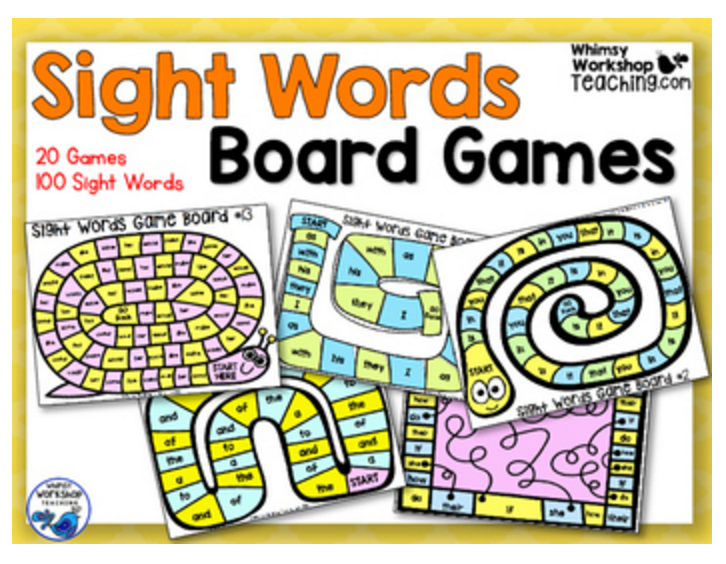 Print out a fun blank rainbow template and let kids repeatedly write sight words in rainbow colors.
Print out a fun blank rainbow template and let kids repeatedly write sight words in rainbow colors.
Read More: My Little Pandamonium
12. Word Counter
Put up pieces of paper around the classroom with sight words written on them. The words should be repeated as students will walk around and tally up how many times they encounter each word.
Read more: Reading Corner Online
13. Build Your Own Words
This is one of the many fabulous hands-on activities that can be done with lego blocks. Use an erasable marker to write words and letters on the blocks and let kids build the words on their own.
Read more: Ray's In Kinder
14. Find a Parking Spot
Little hands that love racing cars around will enjoy this easy game. It works best with an individual child and can be done over and over with new words on each sheet of paper.
Read more: Ms Benders Classroom
15.
 Window Writing
Window Writing It's not every day that kids get to write on windows, let alone be encouraged to do so! Let the class students write the sight word of the day on a window each day as they get to class.
Read more: Kindergarten Matters
16. Secret Message
When kids write with a white crayon on a blank sheet of paper, they can use watercolor paints to expose the secret words. It's great for kids with foundation reading skills who are still building confidence in a fun and creative way.
Read more: Teach Starter
17. Q-tip art
Beginner readers will enjoy this hands-on activity. They use a q-tip to put paint in the dots of this fun printout. It will also help them focus and take their time on the activity while strengthening their fine motor skills.
Read more: Teachers Pay Teachers
18. Keyboard Practice
Old keyboards or keyboard covers are wonderful resources to practice new words.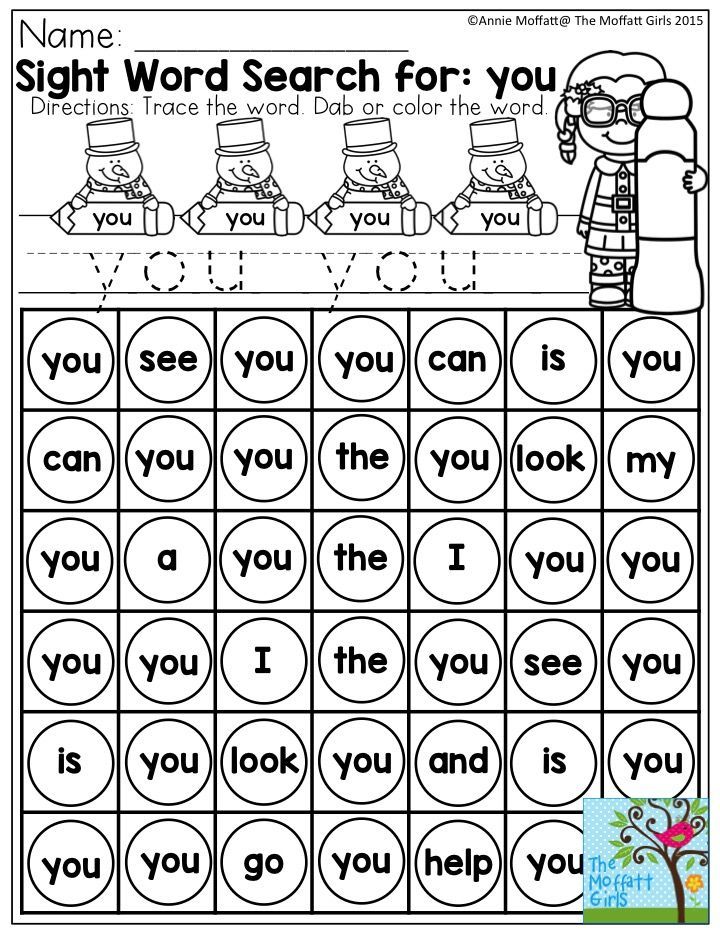 Students can type words or complete sentences from the cards you provide. This is one of the fast-paced challenges that will help kids improve their typing skills too.
Students can type words or complete sentences from the cards you provide. This is one of the fast-paced challenges that will help kids improve their typing skills too.
Read more: Life Between Summers
19. Teacher Wears Words
This is a great activity for a busy teacher looking to incorporate games throughout the day. Wear sight words pinned to your shirt and change them as the day goes by. Students have to read the word every time the teacher approaches them.
Read More: The Primary Partner
20. Hopscotch
Draw some hopscotch blocks on the ground and add the sight words to the shapes. Students get to be active and have fun while learning to read these words quickly as they jump through the course.
Read more: Where the Literacy Grows
21. Take a Cakewalk
Cakewalk is another fast-paced reading challenge where kids walk around until the music stops. Call out one of the written site words and the student standing on that word wins the round.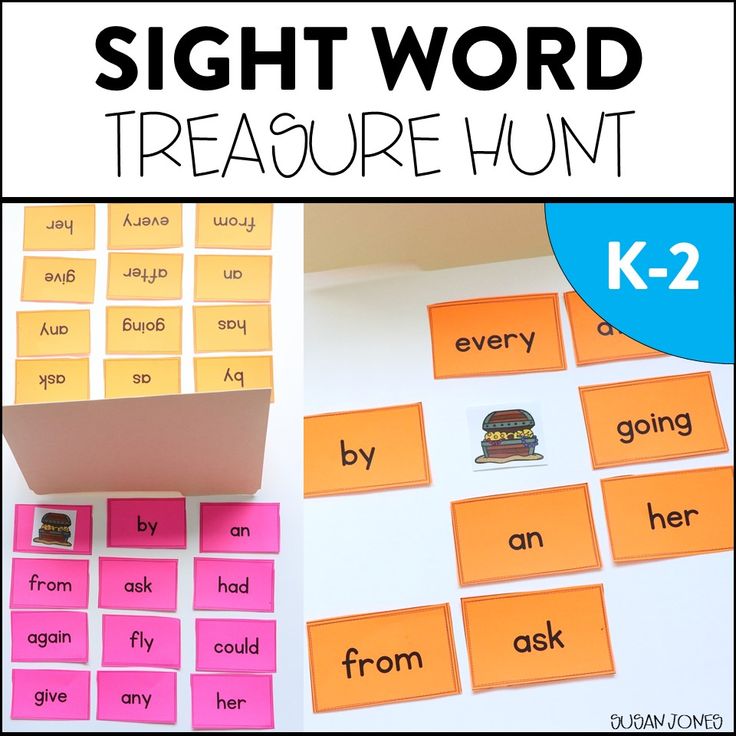 Kids will love being silly to the music and playing outside.
Kids will love being silly to the music and playing outside.
Read more: Joyful In Kinder
22. Sight Word Bowling
A few blowing pins in your arsenal is always a winner. Write some sight words on the pins and have students roll a ball to knock down the words you call out.
Read more: The Creative Teacher
23. Target Practice
Kids will go crazy to have a go with the NERF gun. Stick some sight words on a target and let kids take turns to shoot at the words and try to hit the targets.
Read more: Lauren's Lil Learners
24. Muffin Tin Game
This is another fun hand/eye coordination game to learn sight words. Write words on the inside of cupcake wrappers and put them in a muffin tin. Let your child toss a little ball or rock into the correct wrapper as you call them out loudly.
Read more: Fun With Linda
25. Sight Word Checkers
This classic board game can quickly be earned into a fun game to learn sight words.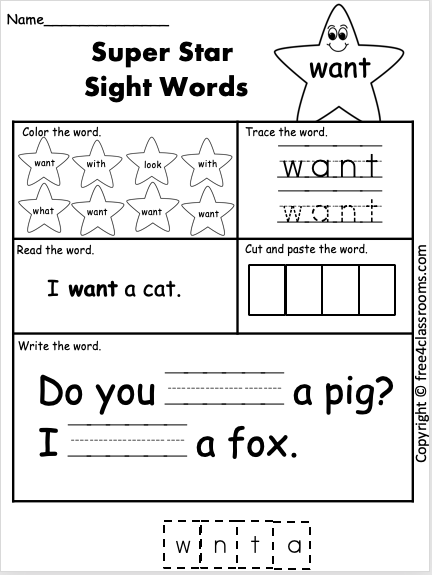 Print out a board or write words on a board you have and let students read out the words as they move around the board.
Print out a board or write words on a board you have and let students read out the words as they move around the board.
Read More: My First Grade Adventures
26. Sight Word Guess Who
This is another of the classic board games that never gets old. CHange out the traditional images with sight words and print out some clue cards. Once you set up this game you can play it for a long time to come.
Read more: Teaching Mama
TOP 10 word games for all ages
Spoiler: there is a danger that children will enjoy it so much that you may no longer be able to get tired and bribe with your phone.
Modern children are so accustomed to playing exclusively with gadgets that sometimes simple word games are not even familiar to them. Tired of hearing on the bus, in the car, in line: “Maaam, give me the phone!”? Then it's time to remember about "Cities", "Nonsense" and other fun games for which you will not need anything but your time and imagination.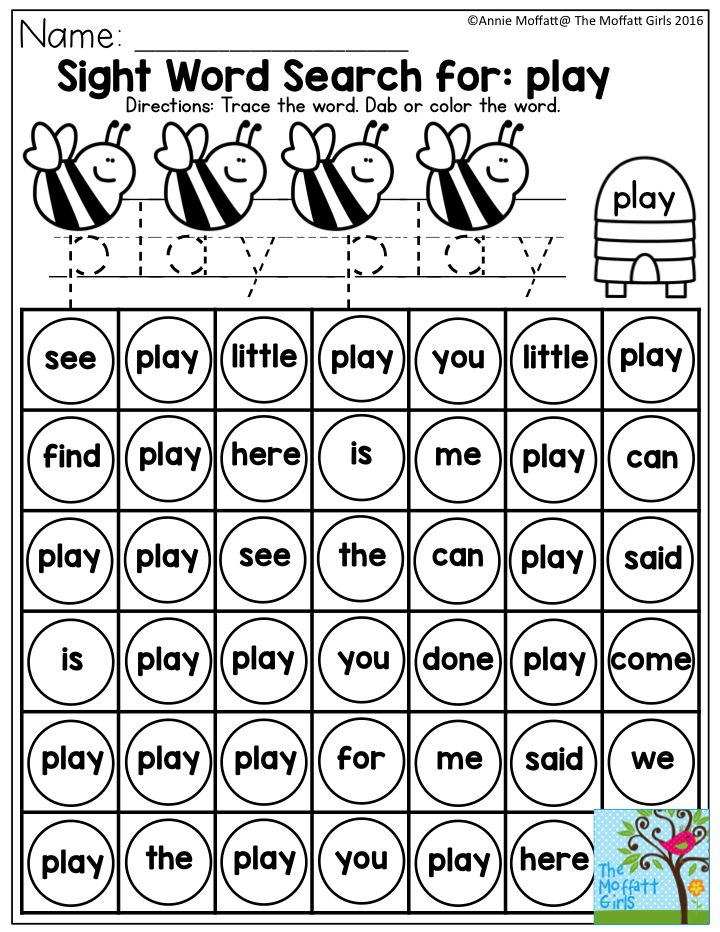 nine0007
nine0007
Games with the name
This is the easiest game available even for preschoolers who are not yet familiar with letters. Perfectly develops phonemic hearing, attention and introduces sounds in a playful way.
How to play? Everything is extremely simple. Together with the child, we determine what letter his name begins with. And now we propose to come up with the maximum number of words that begin with this letter. Sasha is both an airplane, and a samovar, and a tablecloth, and a runner, and a Snickers, and even a spaniel. And then you can remember that Sasha is, in fact, also Alexander. And that means there will be apricots, oranges, pineapples, an airport, etc. nine0004
For those who are older, you can complicate the game and name words only of a certain group. This will help to get acquainted with the concepts of generalization and classification and significantly expand the vocabulary.
On "A" we will first invent only fruits, then vegetables, and then musical instruments.
Search for difficult words
This game is more difficult. It requires concentration, but even preschoolers who are just learning to read will play it with great pleasure. After all, you don’t need to invent words, but look around! Here, by the way, the reaction is also useful. nine0004
First you have to explain what a compound word is. This is a word that consists of several words or a stable expression of two words that refers to one thing.
Ready to find a dairy and concrete mixer? A motorcade, a gas station and a phone booth? Then go ahead. Ideal for long car rides.
With older children, you can take a notebook and keep a record of all the words found. And with those who are younger, pronounce all complex words in syllables.
Story from word
This is an extremely fun and entertaining game that will keep you entertained for a long time. We come up with any word, it is better to start with short letters of 3-4. Let it be SUMMER. And now you need to come up with a new word from each letter.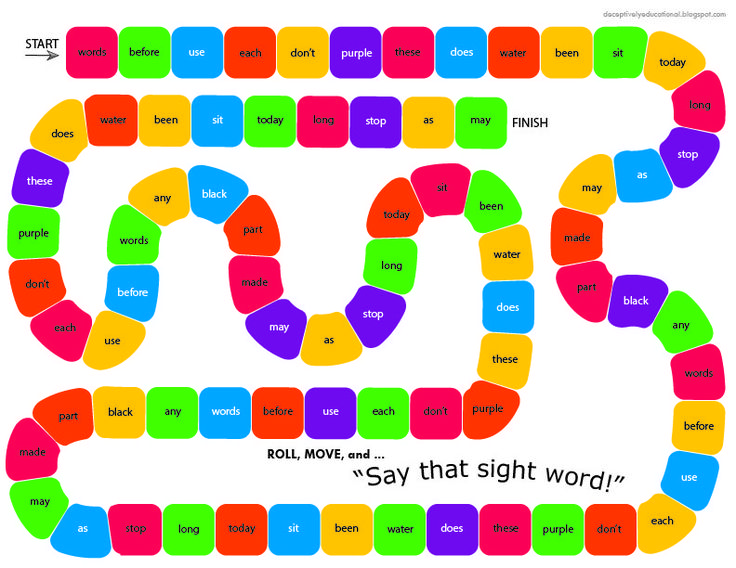 And ideally, so that you get a real mini-story. Suppose Pilot Raccoon rumbled wildly or Fox Egoza Quietly departed.
And ideally, so that you get a real mini-story. Suppose Pilot Raccoon rumbled wildly or Fox Egoza Quietly departed.
The benefits of the game: the child learns to coordinate words according to the meaning and masters the logic of the story.
How many one-word stories can you come up with? nine0004
Nonsense for the letter ….
Can you think of a story where all words start with the same letter? And you try! It can be very funny.
“Frantic possum Oleg very carefully walked around the garden outskirts”
Or “Sleepy pig Sasha sat angrily with a chest of soot”
By the way, you can choose a letter by the name of the players, or you can learn the alphabet in parallel. In this case, one calls the number, and the second counts the letter of the alphabet. In a couple of months, the alphanumeric letter will fly off from the teeth. nine0004
Guess what I guessed
This is the easiest game for preschoolers. Teaches to classify objects, to determine their properties and features.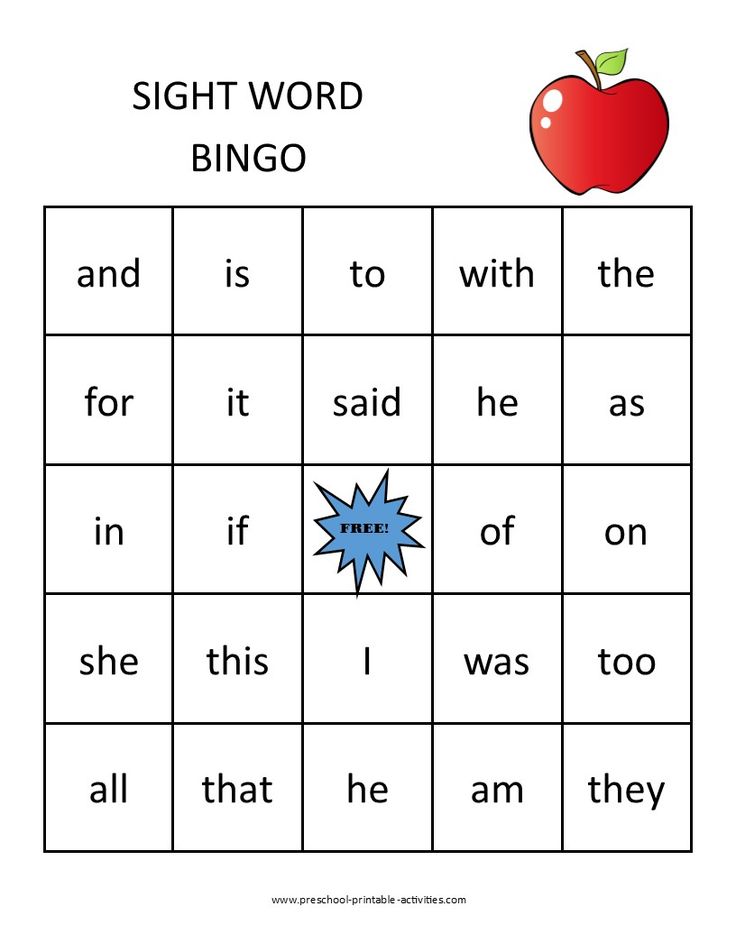 You think of a word and give one hint. Suppose you think of a brick road sign and say "It's round." If the child did not guess correctly, give the following hint: "It's red." And so on ad infinitum. Don't forget to switch roles.
You think of a word and give one hint. Suppose you think of a brick road sign and say "It's round." If the child did not guess correctly, give the following hint: "It's red." And so on ad infinitum. Don't forget to switch roles.
Danetka
If in the “guessing game” everyone just guesses the objects, then in “Danetka” you need to connect analytical thinking. The game teaches how to correctly compose and ask questions, listen carefully to the answers and analyze the information received. It is especially great to play danetki if you discuss in advance the number of possible questions. For example, "I thought of some princess, you have 20 questions to find out which one." nine0004
Grandma's Chest
This game is somewhat reminiscent of the famous Snowball. The first one says "I went to the attic and found striped socks in my grandmother's chest." The second continues: "I went to the attic and found striped socks and a teapot in my grandmother's chest." And so in a circle.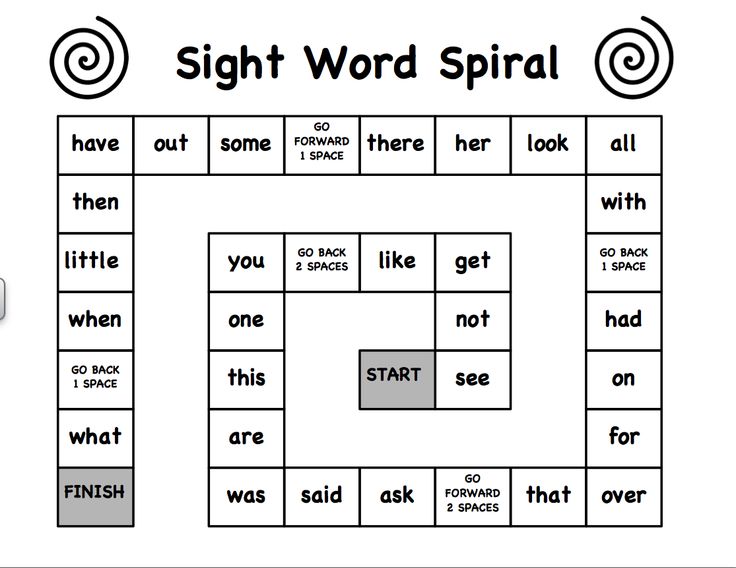 The first one to forget at least one of the items already named loses.
The first one to forget at least one of the items already named loses.
Grandfather's story
A storytelling game that gently teaches the alphabet. The meaning is the same as in the grandmother's chest, only the items will have to be named alphabetically. nine0004
Example: “I went to the attic and found a watermelon, a shoe, a spindle, a nut, a plank, a raccoon, a hedgehog, a chewing gum, a splinter, a needle”, etc.
Cities
The city game, beloved by everyone in childhood, does not lose its popularity. It trains phonemic hearing, expands vocabulary and helps to get acquainted with new concepts. Ideal for a large group of children.
Choose a theme (cities, fruits, musical instruments, pieces of furniture, toys, etc.). We name the word, and the next player calls the word with the last letter of the previous one. nine0004
You can change the rules and agree to name as many words as possible according to the given rules for a while. Are you sure that you can name more animals in 60 seconds than your student?
“I know five…”
This fun game from our childhood can be played not only with a ball.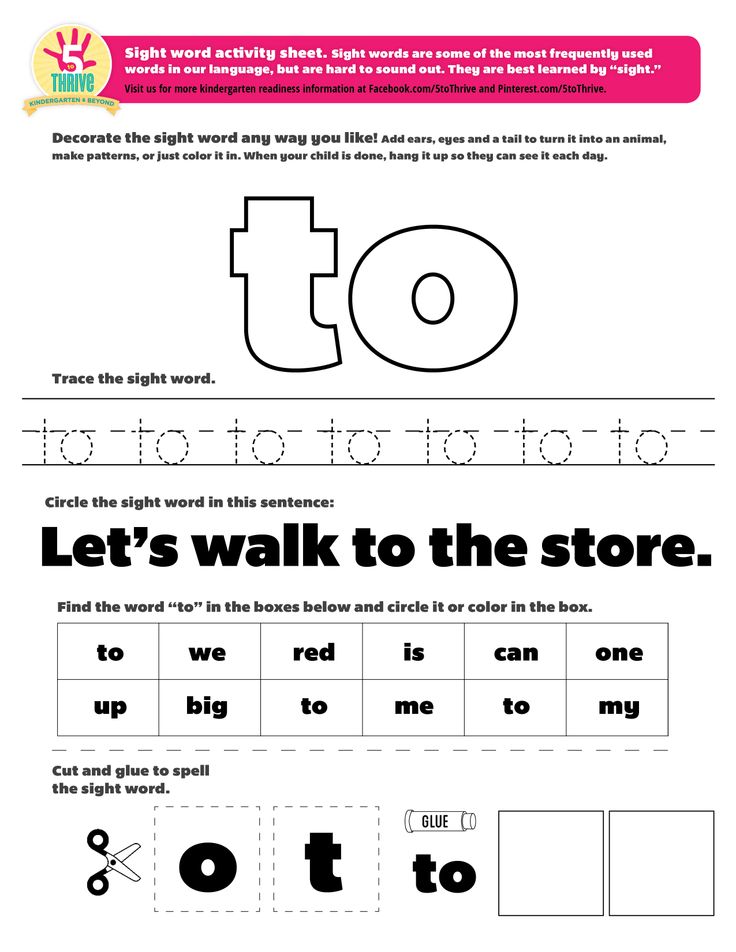 Although it is certainly more interesting with him. The game then develops not only the vocabulary and pumps encyclopedic knowledge, but also hones coordination.
Although it is certainly more interesting with him. The game then develops not only the vocabulary and pumps encyclopedic knowledge, but also hones coordination.
Just offer each player a new category. Masha knows 5 horned animals. Sonya knows 5 names of rivers. "Danya knows 5 composers." nine0004
The older the child, the more difficult the categories can be. With this game, you can learn historical dates and geographical names, world capitals and animals by continent.
If you run into problems during the game, you know what to do at home. Open an encyclopedia and remember what other dinosaurs are, and what other marsupials, besides koalas and kangaroos, live in Australia.
Play, expand your vocabulary, develop your imagination and just be together, because you are a team! nine0004
6 best word games for Android
Think back to when you most often play games on your smartphones . Most likely, the answer will be: on the way home or to work and in order to pass the time in lines.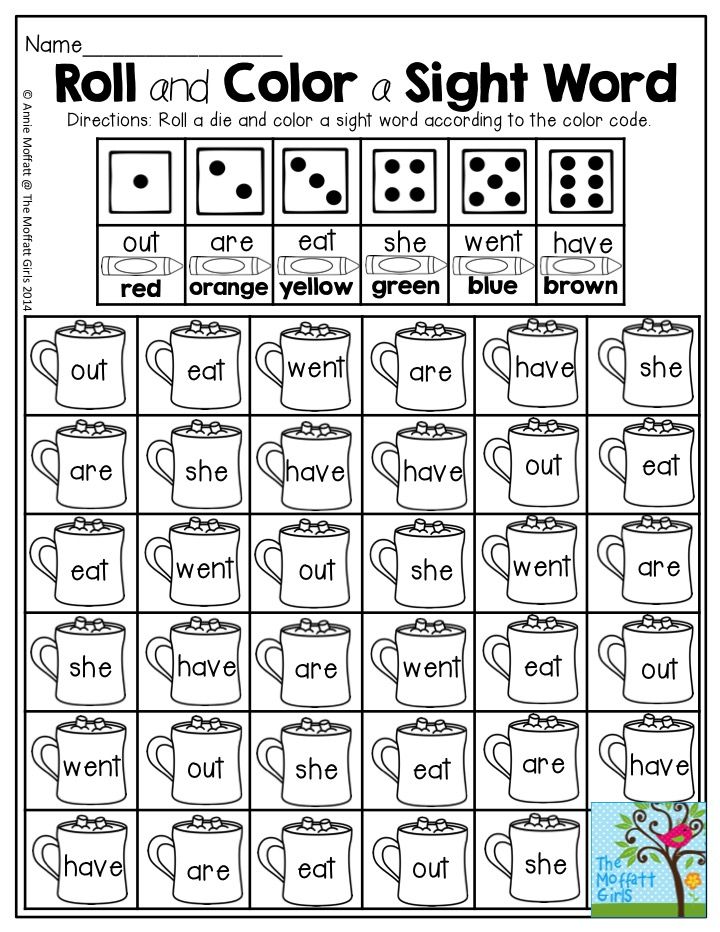 Unfortunately, not all smartphones can pull cool dynamic games with a pumped-over plot. Plus, these titles greatly drain the battery of your device. In such a situation, logical and intellectual games come to the rescue . They do not require a lot of resources, while providing an opportunity to have a great time.
Unfortunately, not all smartphones can pull cool dynamic games with a pumped-over plot. Plus, these titles greatly drain the battery of your device. In such a situation, logical and intellectual games come to the rescue . They do not require a lot of resources, while providing an opportunity to have a great time.
Not everyone wants to spend time in various shooting games.
❗️ SUBSCRIBE TO OUR YANDEX.ZEN TO READ EXCLUSIVE ARTICLES WHICH ARE NOT ON THE SITE
Moreover, such games allow you to keep your brain in good shape and even learn something new. To help you make the most of your time, has selected six of the best word games for smartphones for you on the Android operating system.
Contents
- 1 Make a word from the given letters
- 2 Make a word from the letters of another word
- 3 Download the Word Break game
- 4 Make a word from the letters of the circle
- 5 Download the word search game
- Download Philwords for Android
Compose a word from the given letters
Simple words are given only at the very beginning.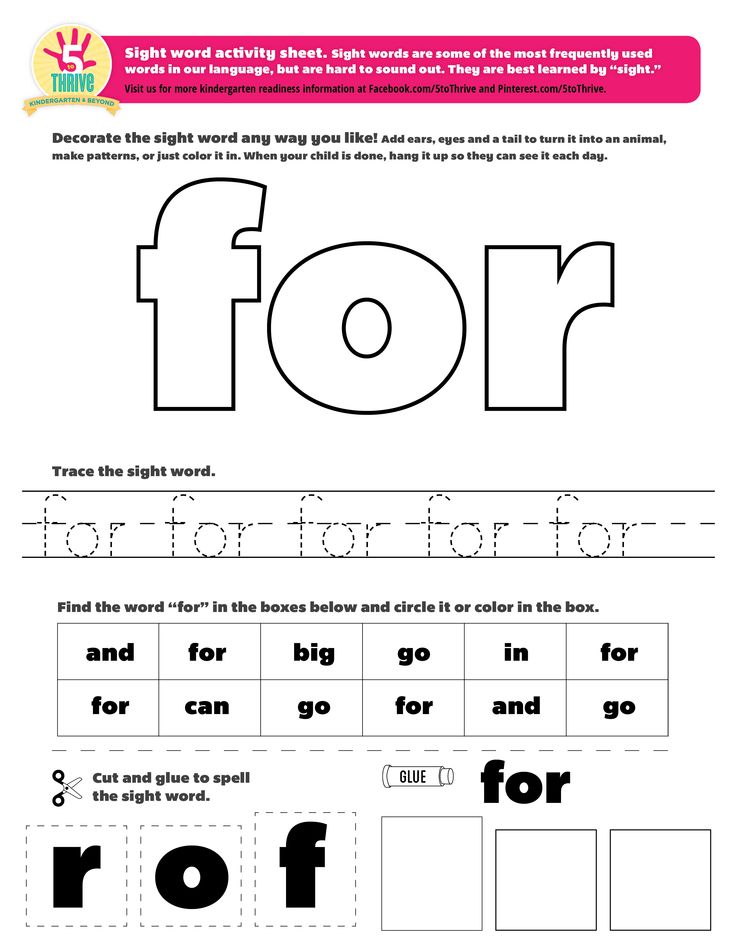
If you are a fan of games of this genre, then WOW should definitely be on your smartphone. The essence of the game is very simple: at the bottom of the page you are given letters that you need to connect with a line and fill the empty slots with words at the top of the screen. Once all the slots are filled with words, you move on to the next level. With each new level, the words become longer and, accordingly, more difficult. nine0004
Such a game not only absorbs your attention properly, but also allows you to broaden your horizons. Thanks to her, it will turn out to learn a lot of new words that can be useful for some everyday activities. In general, I advise this game to anyone who really wants to spend time usefully while sitting somewhere in line.
Download WOW
Compose a word from the letters of another word
The appearance strongly resembles a school notebook.
The next game I would like to tell you about is called “Words from Words”.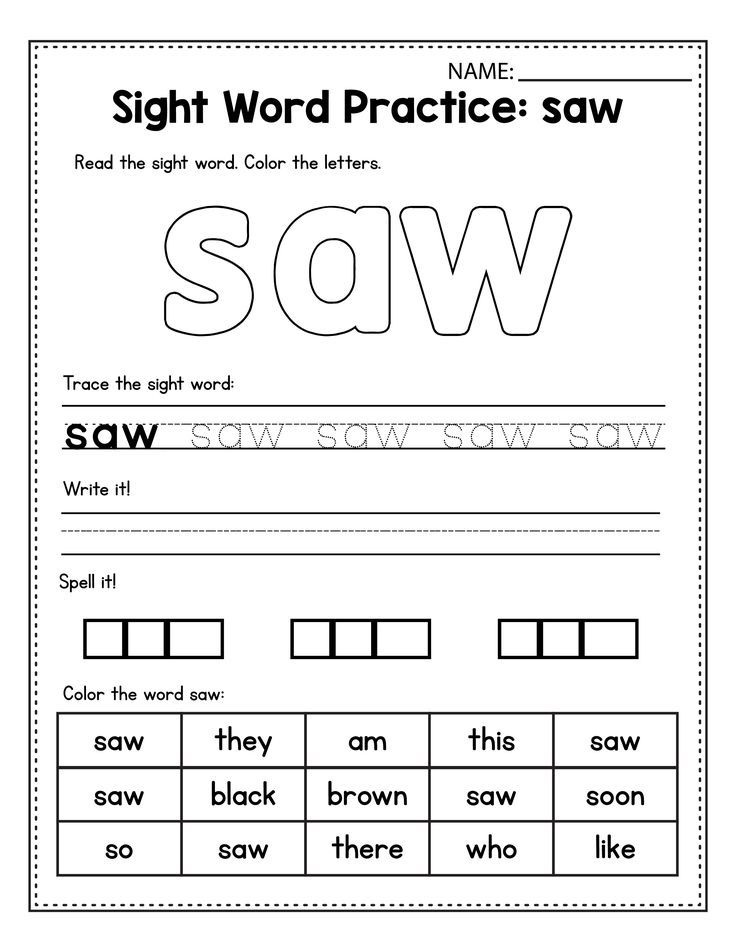 As you can understand from the name, you are given a word, from the letters of which you need to come up with other words. On the screen you can see how many new combinations can be made and how many letters they will include. nine0004
As you can understand from the name, you are given a word, from the letters of which you need to come up with other words. On the screen you can see how many new combinations can be made and how many letters they will include. nine0004
❗️ SUBSCRIBE TO OUR TELEGRAM CHAT. THERE YOU CAN TALK WITH OTHER READERS AND EVEN OUR AUTHORS
A very interesting game that allows you to think logically and does not let you relax even for a second. Takes time worse than any tanks. After all, it's very interesting - to check what your brain is capable of without prompts.
Download Words from Words
Download the game “Break Words”
Destroying the tower will take you to the next level. nine0004
Surely many of you remember what is Tetris . Moreover, for the majority, the most popular game in it was precisely the classic arrangement of blocks of various shapes, in which, with the correct arrangement, the bottom row disappeared, and the game could become endless.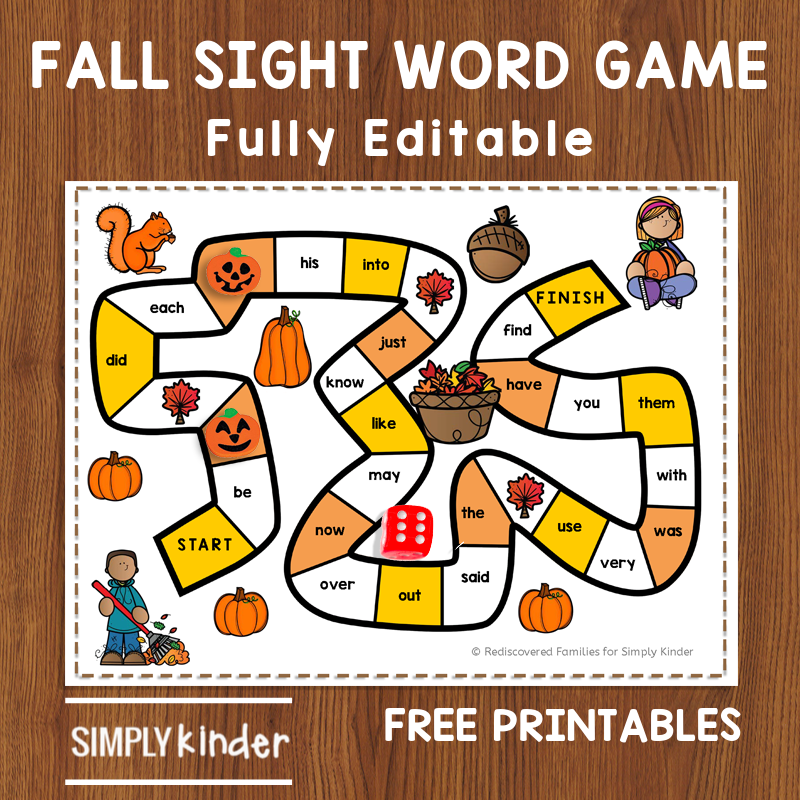 In the “Break Words” application, the principle is reversed.
In the “Break Words” application, the principle is reversed.
You are given a tower consisting of the letters . Collecting words, you need to destroy this tower. If collecting is not your thing, then you should try to destroy. This action is definitely easier and should appeal to a significantly larger number of players. nine0004
Download Break words
Make a word from the letters of the circle
Ads really interfere with this game.
The game “Sea of words” is essentially an analogue of the above-mentioned “WOW”. The same principle. Assemble the words in the block above from the letters below, connecting them with a line. I indicated this application only for the reason that it seemed to me somewhat more complicated than WOW.
❗️ SUBSCRIBE TO ALIBABA’S TELEGRAM CHANNEL TO BUY ONLY THE BEST GOODS FROM ALIEXPRESS
The words offered here are a little different, so it can drag on an order of magnitude stronger.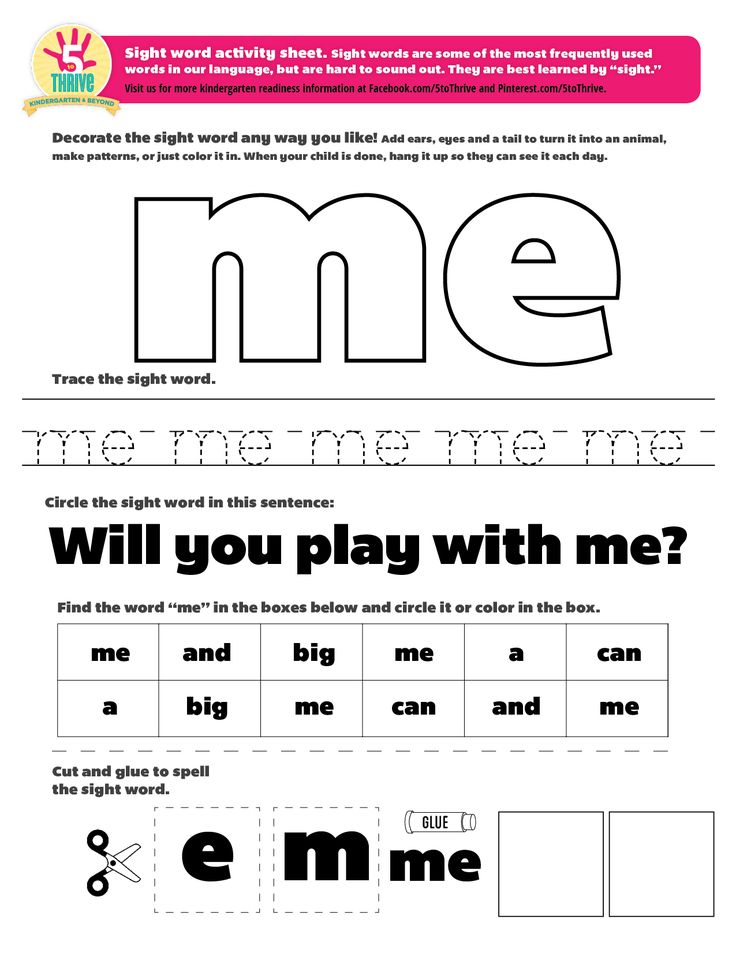 Unfortunately, this game has a significant disadvantage. Advertisements are displayed on every page. And, to be honest, it is quite an eyesore. Of course, you can completely disable the Internet for her , and there will be no problems with advertising banners, but these are already troubles.
Unfortunately, this game has a significant disadvantage. Advertisements are displayed on every page. And, to be honest, it is quite an eyesore. Of course, you can completely disable the Internet for her , and there will be no problems with advertising banners, but these are already troubles.
Download Sea of words
Download the game “Search for words”
Previously, words were searched exclusively on pieces of paper. nine0004
The word search game can make you feel nostalgic. Previously, such puzzles were often offered in schools to test the horizons of students. Its essence is as follows: you are given a square of a certain size, the field of which is filled with letters. It is necessary to connect these letters into words with straight lines. In this case, the word cannot be broken and can only be straight.
On the one hand, it seems that everything is very simple. Well, it can be difficult to highlight the right words. On the other hand, try to identify the right word in a bunch of letters with your eyes.